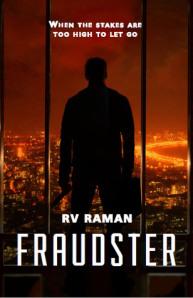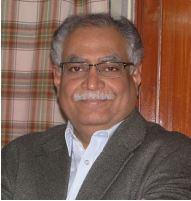
Click to read review
I am extremely happy to be publishing my first author interview on the blog today. When Suresh, a friend and fellow blogger got in touch with me on Facebook and mentioned that he was a friend and batch-mate of RV Raman, author of Fraudster (a book I really liked, read my review of the same here), I immediately called on a favor and asked him if I could get his friend’s contact details to get an interview published on my blog. He obliged and thus, the interview happened.
But before the interview, let’s all read up a little more about RV Raman, shall we…

RV Raman was the head of KPMG’s Consulting Practice and the co-head of their Risk Advisory Services. He was also a Partner with A.T. Kearney and Arthur Andersen. Over a career spanning three decades and four continents, he advised several banks, financial institutions, regulators, stock exchanges and corporates on matters of strategy, operations and risk management.RVR Small
Outside the financial services industry, he has worked with a number of companies, trade associations and government bodies across multiple sectors. He now teaches business strategy at an IIM, mentors young entrepreneurs, advises select clients and writes.
Tired of extensive physical travel around the world, he now prefers less punishing mental excursions into fictional worlds of his own creation. He lives in Chennai.
Read more about the author and his work at his website rvraman.com
And now, the interview itself…
- The genesis of the author in you: Sir, you have had extensive corporate experience with KPMG, AT Kearney and Arthur Andersen over the course of three decades, and am sure have had a challenging and fulfilling career. So, what made you decide to write a book at this juncture in your life?
Even though consulting offers more variety than most professions, three decades is a long time. There comes a point when the sameness of any profession would get to you, and you yearn for change. You seek out additional dimensions in your life. It was in this quest for new dimensions that led me to try my hand at writing and teaching.
Besides, I have always liked to create, and I have been luckier than most in this regard as far as my professional career is concerned. So, when the choice in writing came down to fiction or management non-fiction (as some have been urging me to attempt), the possibilities of creating whole new worlds tilted the scales towards the former.
- While it is understandable that you placed your first book in ‘corporate thriller’ genre, were you even tempted to go outside your comfort zone and try and experiment with a pure-play ‘crime-thriller’ book at all?
Fraudster is actually not my first novel. My attempts at writing fiction began with epic fantasy, which I write under the nom de plume Kevan Dinn. So, broadly speaking, my ‘comfort zone’ spans SFF and crime fiction.
Before I conceptualised Fraudster, the thought was to write a pure-play mystery novel. But when I looked at the shelves in bookstores and found very few novels set in corporate India, I decided to give the novel a corporate setting. After all, I had an advantage there. The thriller elements came in later to add action and pace.
For the next novel or two, I plan to stick to the corporate thriller sub-genre. But beyond that, I may try other sub-genres, including pure-play ones.
- While all laws, rules and regulations are made with the best intentions in mind, it has always been the case that human greed manages to find loopholes which enable them to be misused to dishonest means. Your book also deals with such loopholes. What, in your opinion, needs to be done to prevent such loopholes in the first place?
This is a far-reaching question, to which I really don’t have an adequate answer. It would be highly presumptuous of me to think that I do. Better men that I have applied their minds to it without finding a solution.
That said, a fundamental weakness I see in our system is that we are rule-based rather than principle-based. Everything, from our laws to the CVC guidelines, attempt to lay down rules for every conceivable scenario. But that isn’t possible, as there are infinite scenarios! Enter, loopholes!
Public sector procurement, for instance, is hamstrung by such guidelines. By emphasising process over principles, it facilitates dubious suppliers entering the system, and that leads to corruption. When credit rating in financial institutions devolve to box-ticking exercises, or become victims of hierarchical cultures, principles are compromised. This blog post describes the result on PSU banks.
Due to profitability pressures, the audit profession risks becoming increasingly rule-based too. This could potentially lead to an erosion of credibility of financial statements. The list is endless, but there are notable exceptions everywhere, thanks to people who place principles above rules.
But a principle-based system has its weaknesses too. For one, it needs to be administered by men and women of high moral fiber. In this, I include lawmakers too. Do we have such people in the right places and in sufficient numbers? Would our elected representatives have the courage to vest in our judiciary the sweeping powers that come with a principle-based legal framework?
At the very least, the change you refer to will need a generational shift.
- It is said that most debut authors tend to mirror their personalities in one of their characters. So, who would you identify yourself with more, Visht or Subbu?
Visht and Subbu share several personality traits – a strong sense of right and wrong, the courage to interpret ‘natural justice’, and the conviction to act on their interpretation. I see them as very similar men with very similar personalities, who have made their name in their respective lines. I identify myself with both.
Professionally however, my line is closer to Subbu’s.
- From Fraudster, I am guessing one of your intentions was to try and ‘dumb down’(for lack of a better term) the financial jargon to ensure that the book reached as wide an audience as possible. Given that your next book deals with the stock exchanges and related happenings, would it be safe to assume that you would follow the same strategy there as well? Is this a conscious choice that you have made, or is that something that just happens with the flow of writing the book itself?
Making the writing accessible to a wide range of readers is important for a new writer. It is a very conscious choice that takes considerable effort.
The workings of the scam in Fraudster, and the presentation scene (made by Sanjay & Subbu to Visht and his colleagues) could have been narrated far more succinctly and forcefully if jargon was used. In fact, my first version was in that vein.
My notes for the next book have a fair amount of stock exchange jargon. I am trying to simplify it as I write the story.
- Take us through your journey from writing the book as a manuscript to finally seeing the same published and on the shelves of bookstores, online and offline.
When you approach publishers for the first time, you get a range of responses (or the lack of it) – from immediate, preliminary interest, to utter disinterest. In the background, lurks the question of what a publisher’s portfolio is, and what kind of readers they are targeting with it. Does your manuscript fit into their portfolio? If it does, is there a vacancy? Do they want to take on a new writer?
Numerous questions that you as a writer are not privy to. The result is that some publishers withdraw after initial interest, but you hope that at least one stays the course.
My experience with Hachette has been satisfying. They have been extremely professional, and very mindful of my sentiments, especially during the editing process. I must say that I have been fortunate to work with a good editor. His work moved the novel up by several notches. He also involved me in designing and finalising the cover.
When the book finally came out in physical form, I was impatient to know how it was being received. This last stage was difficult for me because of my earlier experience of publishing eBooks on Amazon. I was used to receiving up-to-the-minute sales information. I had watched my first fantasy book hit #3 on Amazon’s bestseller list, and stay in the top 100 for a while. I saw thousands download it in the first few months. When Fraudster happened, it took me a while to accept the realities of traditionally publishing a physical book.
By and large, the journey has been fun. Along the way, I’m learning to be more patient and to temper my expectations of the publishing industry. I’m realising that it works like no other industry I know does.
- Let readers know what your future plans for writing involve.
I will continue to write corporate thrillers as well as epic fantasy. I hope to show the next one to publishers sometime in 2015.
While there can be more stories on banking, I don’t want to limit myself to one sector. The rest of the corporate arena beckons.
Related information
Book Fraudster
Author/s RV Raman
Goodreads link Goodreads
Flipkart link Flipkart Link
Amazon link Amazon Link
